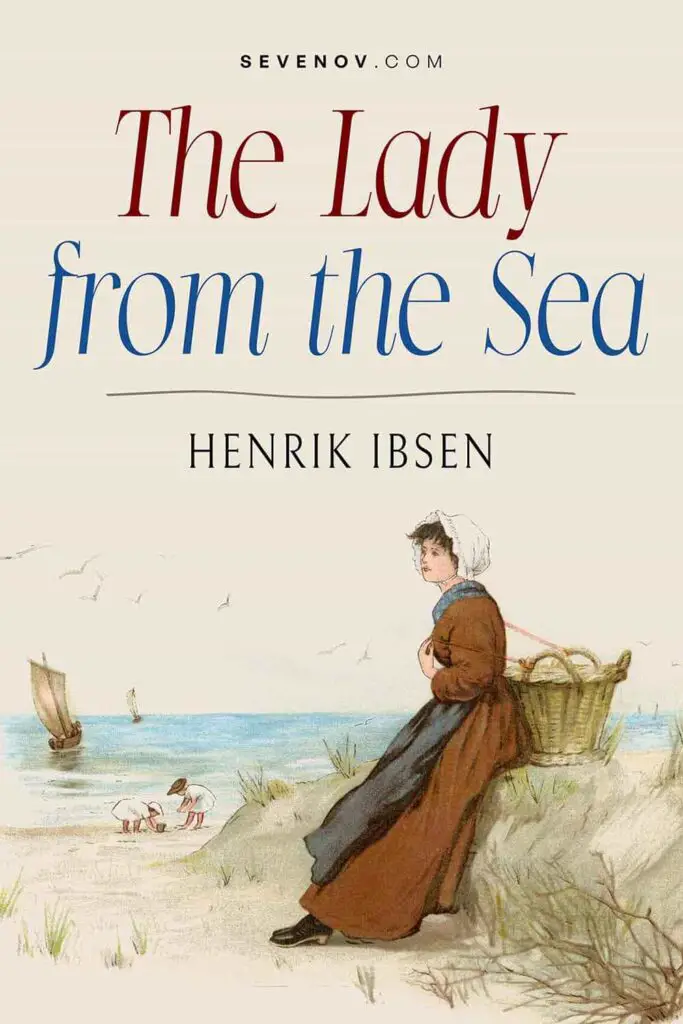
The Lady from the Sea by Henrik Ibsen
Author: Henrik Ibsen
Published: 1888
Genre: Drama
Read The Lady from the Sea online at PageVio
The Lady from the Sea (Fruen fra havet) is a play by the Norwegian playwright Henrik Ibsen written in 1888.
It drew inspiration from the Scandinavian ballad, Agnete og Havmanden (‘Agnete and the merman’). In this ballad, a merman woos a human woman and persuades her to leave her children and come live with him in the sea.
A supporting character in the play, Hilde Wangel, appears again in Ibsen’s later work, The Master Builder.
1. The Lady from the Sea Synopsis
Ellida is the daughter of a lighthouse keeper who lives with her husband, Doctor Wangel, and his two daughters from a previous marriage, Bolette, and Hilde. She loves the sea, having grown up where the sea meets the fjord, and cannot forget her past relationship with a sailor. When her former lover returns, she is forced to choose between sailing out to sea with him or remaining on land with her husband.
2. The Lady from the Sea Summary
Ellida is obsessed with the sea, having grown up as the daughter of a lighthouse keeper. The sea represents freedom and danger, two elements lacking in her unsatisfying married life. Her husband, Doctor Wangel, is a physician with two daughters from his previous marriage, Bolette and Hilde. Their marriage was one of convenience rather than love – Wangel needed a mother for his daughters, and Ellida wanted a man to support her.
Ellida’s inability to get over her past romance with a sailor manifests her yearning for a more adventurous existence. As she becomes increasingly troubled over him, her husband invites Doctor Arnholm, Bolette and Hilde’s former tutor, to help her. Arnholm is also a former suitor of Ellida.
Years ago, Ellida was in love with and engaged to a sailor. However, the sailor murdered his captain and had to escape. He told Ellida to wait for him and has returned to claim her. This mysterious sailor is also known as ‘The Stranger’ and embodies the untamed wilderness of the sea. He has no name, no ties to the world on land, and is unrestrained by the laws of society.
Disenchanted with the restraints of conventional life, Ellida feels drawn to him once more.
Ultimately, Doctor Wangel gives Ellida the freedom to choose between staying on land with him or leaving with her former lover. This freedom of choice breaks the sailor’s hold on Ellida, as she no longer needs him to fulfill her desire for freedom. She decides to stay with Doctor Wangel and work on her marriage.
3. Characters
Ellida Wangel – The protagonist of the play. Although she is married to Doctor Wangel, she still yearns for her former lover, a sailor.
Doctor Wangel – Ellida’s husband.
Bolette Wangel – Doctor Wangel’s elder daughter.
Hilde Wangel – Doctor Wangel’s younger daughter.
Doctor Arnholm – Doctor Arnholm is Bolette and Hilde’s former tutor. He was also Ellida’s suitor in the past.
The Stranger – The Stranger is Ellida’s former lover, a sailor who murdered his captain and had to escape.
4. Themes
Freedom
In The Lady from the Sea, the sea represents freedom for Ellida, who believes she is trapped in a loveless marriage. In contrast, the land represents safety and the constraints of society. It is also reminiscent of her marriage to Doctor Wangel, a partnership Ellida says is akin to selling herself to him. Although Ellida is materially comfortable in her home, she feels trapped and out of her element, like a mermaid on dry land. As such, she is unable to fulfill her duties as a wife and mother.
The sailor who Ellida is enamored with is like the sea. He is a mysterious character who calls himself ‘Freeman’ and is indifferent to human laws and social norms. Although he killed a man in the past, he shows no remorse as he sees the murder as an act of justice. He openly pursues a married woman, leaping over the garden fence of her family’s house instead of coming in through the gate. As embodied by the sailor, freedom is synonymous with the limitless pursuit of self-fulfillment. This freedom is what Ellida yearns for at first.
By the end of The Lady from the Sea, Ellida’s definition of freedom has changed when Doctor Wangel offers Ellida another type of freedom. He relinquishes his control and allows her to choose whether to stay with him. This freedom consists of taking responsibility for her life decisions. Instead of being controlled by her desire for material comfort or attraction to the sailor, she decides to work on her marriage.
Evolution
Ibsen’s preparatory notes suggest that he knew that life on land evolved from sea-dwelling creatures. He wrote, “.. A species of fish represents an early link in the evolution [of mammals]. Are there traces (rudiments) of it still left in the human soul–at least in certain human souls?”
Ellida’s yearning for the sea can be seen as a lingering memory of humanity’s earliest sea-dwelling ancestors. It is a primal desire that conflicts with her sense of self-control, a quality that distinguishes her from animals. The play’s title, “The Lady from the Sea,’’ implies that the sea is Ellida’s natural element, and she suffers from her unfulfilled desire to throw off the restraints of society and return to nature.
As The Lady from the Sea progresses, the animalistic sailor is pitted against a modern man of science, Doctor Wangel. Ellida’s ultimate decision to remain with Wangel symbolizes the subjection of her primal desires to her human freedom of will, signifying the progress of humanity. The biological evolution from fish to man is mirrored by Ellida’s intellectual evolution from a person being controlled by desire and social norms to a person with an independent will. Rather than returning to nature, Ellida chooses to find freedom within the constraints of human society.
| Henrik Ibsen Bibliography | |
| Dramas | Catiline | The Burial Mound | Norma, or A Politician’s Love | St. John’s Eve | Lady Inger of Ostrat | The Feast at Solhaug | Olaf Liljekrans | The Vikings at Helgeland | The Mountain Bird | Love’s Comedy | The Pretenders | Brand | Peer Gynt | The League of Youth | Emperor and Galilean | The Pillars of Society | A Doll’s House | Ghosts | An Enemy of the People | The Wild Duck | Rosmersholm | The Lady from the Sea | Hedda Gabler | The Master Builder | Little Eyolf | John Gabriel Borkman | When We Dead Awaken |




